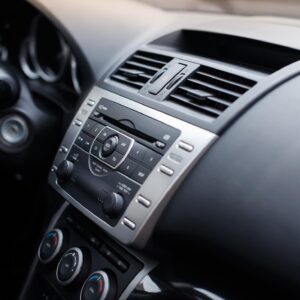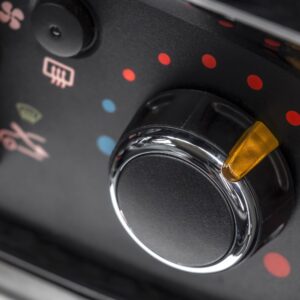When the chill outside your car seeps into the cabin, your first reaction is probably to fire up the heater. But what happens if you catch the stink of something burning coming from the air vents while the heater is running? You don’t want the burning smell to permeate your clothes or upholstery, but you also don’t want to shiver throughout the drive.
So, what might cause such a burning smell from the car heater? How can you identify the root of the problem and fix it?
What’s That Burning Smell From the Heater of My Car?
Knowing the usual suspects behind any burning smell when the heater is on in the car can help you determine what’s causing the problem in your vehicle.
Here are the most common reasons behind the burning smell from the car heater:
Dirty Cabin Air Filter
The cabin air filter screens the air flowing through the air vents. It captures airborne particulates such as dirt, dust, and pollutants, preventing the unhealthy substances from reaching the interior of your car.
Most vehicles have one cabin air filter. Look at the back of the glove box below the dash. You can usually find the filter there. Other air filters sit under the hood, behind the firewall.
Over time, the cabin air filter accumulates dirt and dust on it. When hot air from the heater passes through the filter, the captured particulate matter might heat up and even burn. The smell of the heated dust and debris might be what your nose picks up from the air vents.
Dirty Air Vents
Vents transport air from the HVAC to your car’s cabin. If the A/C is running, the vents direct airflow to the A/C condenser for cooling before sending the cooled air to the interior. If the heater is running, the vents move air to and from the heater core. They distribute the cooled or heated air to where it’s needed.
Debris and dust can enter the air vents from inside your car. The particulates can ignite when they come into contact with the heater while the latter is running. Burning particulates release smoke and an acrid scent that you can smell.
Dirt can also build up in the rest of the heating, ventilation, and air-conditioning (HVAC) system. Hot air from the heater can burn these as well.
Dirty Engine Bay
Various kinds of dirt and debris can enter the engine bay through the front grille, the opening left by a raised hood, and even from below. But you might be wondering how a dirty engine can lead to a burning smell when you turn on the heater of your car.
It so happens that the engine bay contains several parts of the HVAC system, such as the heater core. Dirt and debris in the engine bay might enter the ventilation system through the connections between them. When you run the heater, the hot air can burn the debris in the engine bay, leading to a burning smell.

Bad Blower Motor
The blower motor is a critical part of your car’s HVAC system. It spins the blower fan that forces air through the HVAC and out the vents. The fan ensures that the air can reach the occupants of the vehicle.
When you put the HVAC system in heating mode, the blower fan pushes air across the heater core. The heated air continues to move into the passageways leading to the cabin.
Problems with the blower motor can cause its coils or wiring to run hot, and the sharp smells of heated metal and burnt plastic could join the air heading to the cabin. You commonly have to replace the blower motor, its resistor, and/or its connector because the parts fail often.
It is very common for blower motor resistors, and connectors to burn. It is also actually very common to have to replace the blower motor, blower motor resistor, and the connector all at the same time.
–Anthony Harlin, ASE Certified Master Automobile Technician
Faulty Heater Core
The heater core is the heart of the HVAC system’s heating function. The air outside the car passes over the core, propelled by the blower fan. The core’s high temperature heats the air, which moves to the cabin.
Typically, the heater core uses coolant fluid drawn from the engine to raise its temperature. The coolant carries heat absorbed from the engine. When the fluid passes through the core, heat radiates from it, much like how the radiator vents heat.
As the heater core wears out over the years, it can develop issues that compromise its performance. One of the symptoms of a bad core is a burning smell from the vents. One or more components of the core might have overheated or burned out.
Engine Coolant Leak
Old and damaged heater cores can have leaks that release engine coolant. The coolant can evaporate or burn if it comes into contact with a hot surface.
Engine coolant generally smells sweet because of ethylene glycol in antifreeze. When burned, antifreeze smells like burning rubber. Breathing in ethylene glycol can harm your health. Furthermore, a leaky heater core will fog up the windshield when you defrost.
Do you smell burnt rubber while running the heater? The odor might come from burning engine coolant from a leak in the heater core.
How Can You Get Rid of the Burning Smell From The Heater?
No one wants to drive with an unpleasant smell in the cabin. Furthermore, some substances can harm your health if inhaled or when they come into contact with your eyes or skin.
You should fix the problem as soon as you can. Depending on the specific part and issue, there are two ways to handle it:
Clean the Dirty Parts
Keeping your car clean is part of its recommended maintenance. Dirt can interfere with the smooth operation of its parts.
Spray Deodorant
If the heater vents or heater core cause odor issues, you can apply a spray deodorant into the recirculation door. The deodorant removes odors in the vehicle.
Replace Faulty Parts
There are some dirty parts that you cannot clean. For example, certain cabin air filters aren’t washable because they use flimsy material that tears at the slightest touch.
Similarly, some problematic parts aren’t repairable. In either case, you must replace these items to get rid of the burning smell whenever you run the heater in your car.
If you possess the right tools and enough experience in DIY car care, you can uninstall faulty parts yourself. Otherwise, consider hiring a trusted mechanic to do the job for you.
Any information provided on this Website is for informational purposes only and is not intended to replace consultation with a professional mechanic. The accuracy and timeliness of the information may change from the time of publication.



























